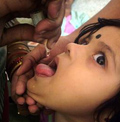 A major immunisation drive in India has delivered a breakthrough which should be celebrated by Europeans and Indians alike. India has now been polio-free for a full year, having previously struggled to contain the disease in some of its poorest regions.
A major immunisation drive in India has delivered a breakthrough which should be celebrated by Europeans and Indians alike. India has now been polio-free for a full year, having previously struggled to contain the disease in some of its poorest regions.
The crippling effects of polio have faded from the minds of Europeans, largely thanks to the success of immunisation schemes starting in the 1950s. However, the disease made an unwelcome return in 2010 when outbreaks were reported in several central and eastern European countries.
The European arm of the World Health Organisation (WHO) traced the source of those polio infections to India, showing just how easily infectious diseases can spread in our increasingly connected world.
The outbreaks undid years of progress in Europe where no cases had been reported for most of the previous decade and cast doubt on whether efforts to eradicate the disease by 2015 were realistic.
An earlier target to wipe out polio by 2012 has not been met. Obviously.
Read: Europe still ‘polio-free’ but vigilance needed
Battleground: India
Along with Nigeria, Afghanistan and Pakistan, India is a key battleground in the fight against polio.
However, despite the availability of vaccines and a global effort to improve health services in remote areas, the disease has proven a stubborn foe.
Reports from India attribute the latest success to the support of Muslim clerics who had previously been hostile to foreign agencies offering vaccination.
In the 1990s, conspiracy theories spread in some corners of the Muslim world that vaccines were part of a Western plot to make Muslim women infertile. However, local religious leaders and government officials have since lent their weight to immunisation efforts, helping to deliver remarkable results.
The WHO has also praised Indian officials for stepping up staff accountability and government oversight. Experts say engaging with the public and tackling vaccine hesitancy were also crucial to India’s success. This experience provides a template which could be used elsewhere, according to observers.
A mass vaccination campaign, mobilising more than a million volunteers, has driven down new cases of polio from 741 in 2009 to 42 in 2010, and then to just one in 2011. This year authorities are hoping for a grand total of zero.
India’s interest is Europe’s interest
Of course, Europeans want infectious diseases to be tamed wherever they are found, although most rarely give Indian polio rates a second thought. But make no mistake, news of India’s success in the battle against polio is very good news for Europeans – even if few will have cause to appreciate it.
Alas, it’s not all good news: just as we should welcome the news about polio, we might also worry about reports from India of a completely drug-resistant form of tuberculosis.
Infectious diseases invented globalisation long before it ever occurred to us: viruses were going around the world back when we thought the earth was flat…




Sue Twine (@suetwine) (@suetwine)
January 16th, 2012
Why you should care about polio in India http://t.co/U4G1fnOO via @vaccinestoday #in
Vacunas.org (@AEV_Vacunas) (@AEV_Vacunas)
January 24th, 2012
Why you should care about polio in India @VaccinesToday
http://t.co/ezZFnBZi